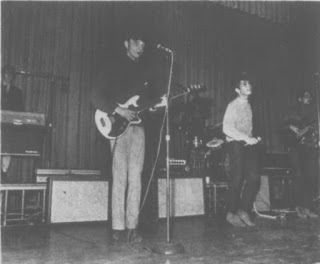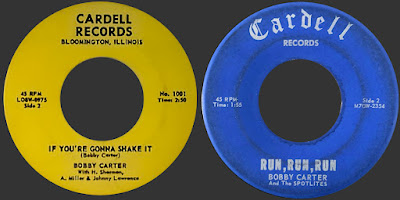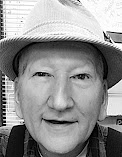Thursday, April 25, 2024
Maximus, Woof, Jack & Jeris Ross (Bloomington-Normal)
Monday, January 29, 2024
Bill Keen And The Tradewinds (Bloomington-Normal)
Jerry King, 18, of 910 S. Summit, Bloomington, an ISNU student, guitar
Jim Griner, 19, of Cheneyville, another ISNU student, bongos
Don Abbott, 35, 523 N. Main, Bloomington, organist at the Hi-Do-Ho
Neal Kenny, 22, of Louisville, KY, the drummer
Saturday, December 17, 2022
The Lykes Of Us (Bloomington-Normal)
The popular group formed in the fall of 1966 with all five original members attending the same high school in Rockford before coming to ISU.
Wednesday, October 19, 2022
Bobby Carter & Cardell Records (Bloomington)
- "Before We Part and Go" / "If You're Gonna Shake It" (1960)
"Destiny, I Love You" / "Run, Run, Run" (1961)
Given the Danville connection, it is likely that A. Miller is Arlie Miller who recorded his own single in Danville around the same time and like Carter had been a member of the Varieteers. Miller's single "Lou Ann" / "You're The Sweetest Girl" was released on the Lucky label. Jim Foley, another member of The Varieteers, also released a single on Lucky in 1960.
Arlie Miller would go on to open the Midnite Sound Studio in Danville and start Milky Way Records with Arlie Neaville (aka Dean Carter) a few years later. As for H. Sherman and Johnny Lawrence, it is unknown if they were from Bloomington, Danville or somewhere else entirely.
For the next decade or so, Bob Carter's musical activities are also uncertain. In 1973 however, he moved to Nashville and recorded a demo that eventually landed him a deal with Oweman Records. It is not clear whether he ever released anything for the label. He did however have one single released on the Royal American label: "As The Fire Grows" b/w "Soakin' Up Suds."
Thursday, May 12, 2022
Rites of Spring at Illinois State University 1972-1977
- The Guild
- Spencer Davis
- Soul Messengers
- Grenshaw
- Tayles
- Cajun Desire
- Grin
- Ebony Revue
- Probe
- Head East
- The Guild
- Gerry Grossman
- ISU Statesmen
- Ricky Spitfire
- Ebony Rhythm Funk Campaign
- Siegel-Schwall
- If
- Adrian Smith
- Frijid Pink
- Mighty Joe Young
- Country Joe McDonald
- Richie Havens
- Poobah
- Joe Vitale's Madmen
- Mason Proffit
- Golden Earring
- Heartsfield
- Games
- Thin Lizzy
- ISU Black Arts Jazz Band aka Creative Arts Ensemble
- The Notations
- Mary Travers
- Bonnie Koloc
- The Undisputed Truth
- Charlie Daniels
- REO Speedwagon
- Rites was not, and never could be, a controllable event.
- The potential for serious injuries or fatalities is high.
- The laws of Illinois and the regulations of ISU were repeatedly disregarded.
- The cost of the event, direct and indirect, was very high.
- Damage to university grounds and buildings has been severe.
- The event offers no apparent contribution to the educational mission of the university.
Friday, April 1, 2022
Lavender Snapshots (December 7, 1975)
| TITLES | READERS |
| Lavender for My Wings | Robin Tammer |
| Magic | Terry Clark |
| Composure | Jerry McGuire |
| Cold Gusty Winds | John Cook |
| No Words on Her Lips | Robin Tammer |
| Smile, She Said | Jerry McGuire |
| Give the Rainbow to Me | Terry Clark |
| When the Sun Set | Robin Tammer |
| Anthony, Marc Anthony | Jerry McGuire |
| High Across the Southern Sky | John Cook |
Wednesday, December 29, 2021
Backstreet - California Dreamin' [unreleased, 1970/71]
Monday, May 31, 2021
The War Lords (Bloomington-Normal)
John Schoenhofen - Rhythm Guitar (Junior / ISU, Spanish Major)
 |
| Feb 1966 |
The single was recorded in Chicago at RCA Studios in the summer of 1966 and released on Thor Records. The Windy City label was owned and operated by Donald Thorson and Robert E. Peacock II. According to Popelka, only about 100 copies were pressed.
 |
| Thor Records 810T-0759. In addition to the white label DJ copies, there are also red label stock copies. |
 |
| Oct. 1966 |
Tuesday, April 20, 2021
The McLean County Discography is now available!
Monday, May 25, 2020
Incident At Kickapoo Creek Rock Festival (Heyworth, Illinois) - 50th Anniversary
The Bands

Headlining / National Acts
- Smith
- New Colony Six
Pat McBride, Ronnie Rice, Bruce Gordon, Chuck
Jobes, Billy Herman and Gerry Van Kollenburg
- The Amboy Dukes (Ted Nugent)
- Paul Butterfield Blues Band
- B.B. King
- The Kinks - One of the earliest advertisements for the festival that ran in the Daily Illini included the Kinks on the bill. Their name was gone however from all the promotional materials that followed. The Kinks performed in Chicago at the Aragon Ballroom on May 29th and 30th instead.
- Delaney & Bonnie & Friends - appear to have been scheduled right up until the start of the festival. It is unclear why they cancelled or were not able to play.
Supporting / Regional Acts
- Aorta - from Rockford / Chicago, Illinois. The band was listed on early advertisements for the concert but was dropped from ads as the event got close. No evidence that they were there.
- Arrow Memphis - from Collinsville, Illinois.
- Backstreet - (aka Backstreet Majority) from central Illinois. Band members included Harry Washburn, Bobby Carlin, Michael Day and Howie Reeder.
- The Basic Need - from central Illinois (possibly Clinton).
- Bloomsbury People - from Waukesha, Wisconsin.
- Blue - from St. Louis, Missouri. Michael MacDonald was at some point a member of this group (see also The Guild). Other members included Russ Bono, Pat Malloy and Bob Bortz.
- Bluesweed - (aka Blues Weed) from Champaign-Urbana, Illinois. According to an interview with band members Perry Hamilton and James Kingelhoffer, the group was at the festival and scheduled to play but a downpour of rain right before going on postponed their stage time and they were ultimately bumped.
- Bucktooth - (aka Buck Tooth) According to Feb 1970 ad, Buck Tooth was made up of former members of four popular Champaign-Urbana area groups.
- The Challengers - by one newspaper report this group performed on Friday.
- Devil's Kitchen Band - from Carbondale, Illinois however the group relocated to San Francisco from 1968-1970 and was the "house band" at the Family Dog Ballroom. Having returned to Illinois around the time of Kickapoo, the group got added to the bill at the last minute when their managers (John Loyd and Harvey Morrison) were asked to help run the festival's sound. Devil's Kitchen performed in the afternoon on Friday or Saturday. Band members included Bob Laughton, Brett Champlin, Randy Bradle, and Robbie Stokes. This was their last concert.
- East Street - ?
- The Esquires - originally from northern Illinois though based in Champaign-Urbana at this time. By one newspaper report this group was the very first to perform with a start time of midnight, early Friday morning.
- Fat Water - from Chicago / Champaign-Urbana, Illinois. Band members included: Vicky Hubly, Bill "Boris" Schneider, G.E. Stinson, Don Cody and Peter Milio.
- Feather Train - (aka Feathertrain) from Champaign-Urbana, Illinois. Members of the group at this time would have been Bruce Hall, Frank Pytko, Dana Walden, Larry Mitchell, Gary Richrath, and Freddie Fletcher.
- The Finchley Boys - from Champaign-Urbana, Illinois. Members of the group included George Faber, Garrett Oostdyk, J. Michael Powers and Larry Tabeling. According to guitarist Garrett Oostdyk the band's stage time was moved up to noon on Sunday to help "wake up the crowd."
- Dan Fogelberg - from Peoria, Illinois and reportedly played at Kickapoo though not listed on any promotional posters or advertisements. In 1970, Fogelberg was still a student at the University of Illinois and performed primarily in coffee houses around Champaign-Urbana. He was however represented by Blytham Ltd. so it is possible he was at Kickapoo. Here is what Dan sounded like in 1970:
- For Days & A Night - from Chicago though they played around central Illinois frequently.
- Fuse - from Rockford, Illinois. Band members included Rick Nielsen (Cheap Trick), Joe Sundberg, Craig Myers, Chip Greenman and Tom Peterson (Cheap Trick). According to drummer Chip Greenman, Fuse was the opening act launching the festival. This however conflicts other such claims. In the photo below you can see Fuse's van backed up to the Kickapoo stage.
- Genesis - most likely a Champaign-Urbana group though possibly from Wisconsin. They played in C-U a lot in 1970. Definitely NOT the English rock group featuring Phil Collins and Peter Gabriel as has been reported in the past. Also NOT the American psychedelic group from Los Angeles that released an LP in 1968.
- Gidians Bible - from Bloomington-Normal, Illinois.
- The Guild - from Mascoutah, Illinois. Michael MacDonald was a member of this group around this time (see also Blue).
- Hot Set Up - ?
- Joe Kelley Blues Band - from Chicago, Illinois.
- Light Brigade - from Champaign-Urbana, Illinois
- The Litter - from Minneapolis, Minnesota.
- Monterey Hand - from Chicago featuring guitarist James "JY" Young (Styx). Photo from Kickapoo below appears to show Rick Young, Marco Mundo and JY.
- Moses - from Charleston / Matoon, Illinois. Band members pictured below: Steve Dalton, Marc Nale, Eddie Pearcy, Gary Tate (rear) and Jim Hite.
- Nickel Bag - from Champaign-Urbana, Illinois.
- Night People - from the Quad Cities, IL / IA.
- One-Eyed Jacks - from Champaign-Urbana, Illinois. Band members at the time included Mike Murphy, Tom Kelly and Doug Livingston. One newspaper report published on Saturday May 30th states the group opened the show at 5 pm on Friday. However many accounts have them playing on Saturday evening. Possible that they played twice over the weekend.
- Chuck & Mary Perrin - from Pekin, Illinois. The first to perform on Saturday and Sunday.
- Phoenix - from Granite City / Collinsville, Illinois.
- REO Speedwagon - from Champaign-Urbana, Illinois. Members at the time would have been Terry Lutrell, Steve Scorfina, Greg Philbin, Alan Gratzer and Neil Doughty.
- Siegel-Schwall Band - from Chicago, Illinois.
- Seven - ?
- Spare Chaynge - from St. Joseph, Illinois (Champaign County).
- Tayles - from Madison, Wisconsin.
- The Truth - from the St. Louis area.
- Uncle Meat - from Champaign-Urbana, Illinois. According to guitarist Kent Paris, the group was one of the first bands to play (likely on Friday). In photo below: Kent Paris (rhythm guitar/ vocals), Jim Leonard (road manager), Michael McKeehan (bass/vocals), Chris Martin (lead vocalist), Alan Bates (drums) and Martin Cupp (lead guitar).
- Zebra - ?
Urban Legends & Local Myths
Question: True or false? In the Creedence Clearwater Revival song, "Lookin' Out My Back Door," John Fogerty opens with the line, "Just got back from Illinois ... oh boy!" a magic moment for the Bloomington area, written by Fogerty in 1970 after the band's performance at the Kickapoo Creek Festival in rural Heyworth.
Answer: That's the widely told story. But it's false, says Rick Halberg, a former radio personality at WBNQ and WWCT (today an employee at Country Financial) and a "walking encyclopedia" of rock 'n roll knowledge. Explains Rick, "When I was assisting (B-N filmmaker) Craig Raycraft with the original 'Incident at Kickapoo Creek’ movie, we talked to Fogerty's people about the story. John relayed to us — through his manager — that he had not attended the festival but was resting at home in California after finishing up a European tour. The reason he mentioned Illinois in the opening line of the song? Because it rhymed with `Oh boy!’ "





















































